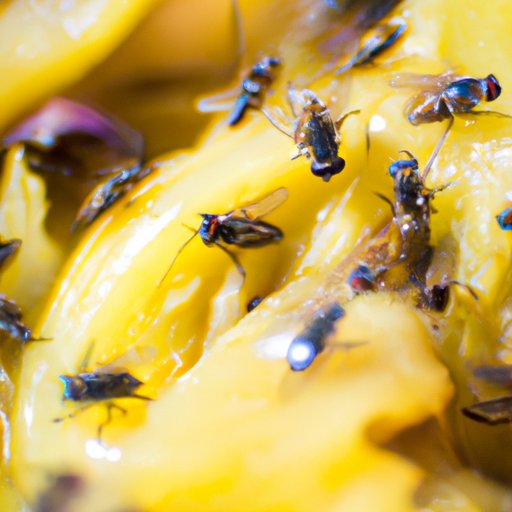
I. Introduction
Fruit fly infestations are a common problem in many households, and while they may seem harmless, they could potentially pose a health risk. In this article, we aim to provide facts and dispel myths about fruit flies and their impact on human health. We will also provide practical tips on how to control and prevent fruit fly infestations.
II. The Truth About Fruit Flies: Do They Pose a Health Risk?
Many people wonder if fruit flies carry diseases that could be transmitted to humans. According to scientific studies, fruit flies are capable of carrying bacteria, viruses, and other pathogens, which could potentially pose a health risk to humans. However, the risk is relatively low compared to other pests, and there is still much to be learned about the exact role fruit flies play in human disease transmission.
It is essential to understand the biology of fruit flies to understand the potential risks they pose to human health. Fruit flies reproduce quickly and thrive in moist, warm environments. They are attracted to ripe and decaying fruit and vegetables and feed on the microorganisms that grow on them. Fruit flies can also breed in drains, garbage bins, and other areas where moisture and food are present.
III. The Top 5 Diseases Fruit Flies Could Be Spreading In Your Home
Although fruit flies are not known to transmit diseases to humans, they can carry disease-causing microorganisms on their bodies and deposit them on food, dishes, and other surfaces. Here are some of the diseases that fruit flies could potentially carry:
- Salmonella
- E. Coli
- Listeria
- Campylobacter
- Hepatitis A
Prevention and early intervention are crucial in controlling fruit fly infestations. Here are some steps you can take to keep your home protected:
- Remove ripe and decaying fruits and vegetables from your kitchen immediately
- Keep your kitchen clean and free from food debris
- Use tight-fitting lids on trash cans
- Inspect incoming food, such as groceries, to ensure that they are free from fruit fly infestations
IV. How to Get Rid of Fruit Flies and Keep Your Home Safe
Getting rid of fruit flies can be challenging, but it is not impossible. Here are some steps you can take to eliminate fruit flies and keep your home safe:
- Locate and remove breeding grounds, such as ripe or decaying fruits and vegetables
- Use apple cider vinegar traps to attract and eliminate fruit flies
- Use fly swatters or vacuums to eliminate adult fruit flies
- Seal cracks and crevices in your home to prevent fruit flies from entering
It is important to remember that prevention is key to keeping your home free from fruit flies. Consistently practicing good hygiene and taking steps to eliminate potential breeding grounds can significantly reduce the risk of a fruit fly infestation in your home.
V. The Facts and Myths About Fruit Flies and Disease
There are many misconceptions about fruit flies and their impact on human health. One of the most common myths is that fruit flies are known to transmit diseases to humans. As we previously mentioned, while fruit flies can carry bacteria and other pathogens, their role in human disease transmission is not yet fully understood.
It is also a myth that fruit flies only infest homes that are dirty or unsanitary. Fruit flies can be found in even the cleanest homes if there is a source of ripe or decaying fruit and vegetables present. Therefore, consistently practicing good hygiene and regularly removing potential breeding grounds is essential in preventing a fruit fly infestation.
VI. Fruit Flies vs. House Flies: Which is More Dangerous?
While fruit flies and house flies both pose a potential health risk to humans, house flies are generally considered to be more dangerous. House flies are known to carry a wide range of pathogens, including salmonella, E. Coli, and anthrax, among others. House flies are also prevalent in areas where animal waste is present, such as farms or suburban areas with backyard chickens or horses.
It is still important to take steps to control and prevent fruit fly infestations, but it is crucial to be aware of the potential health risks posed by other pests as well.
VII. The Health Risks of Allowing Fruit Flies to Infest Your Kitchen
Allowing fruit flies to infest your kitchen can have several consequences, including:
- Contaminated food and surfaces
- Potential transmission of bacteria and other pathogens to humans
- Increased risk of other pests, such as ants or cockroaches, attracted to the source of infestation
Addressing a fruit fly infestation is therefore essential in preventing potential health risks and keeping your home safe and livable.
VIII. Insects in the Kitchen: What You Need to Know About Fruit Flies and Other Pests
Fruit flies are just one of many pests that can infest your kitchen and potentially pose a health risk. Other pests that homeowners should be aware of include ants, cockroaches, and rodents.
The key to keeping your kitchen free from pests is to practice good hygiene and take steps to eliminate potential breeding grounds. Regularly cleaning your kitchen, disposing of trash properly, and sealing cracks and crevices can significantly reduce the risk of a pest infestation in your home.
IX. Conclusion
In conclusion, while fruit flies may not be the most dangerous pests you encounter in your home, they are still capable of carrying bacteria and other pathogens that could potentially pose a health risk. It is important to practice good hygiene and take steps to control and prevent fruit fly infestations to keep your home safe and livable. Being informed about the facts and myths surrounding fruit flies and their impact on human health is the first step in protecting your home and family from potential health risks.




